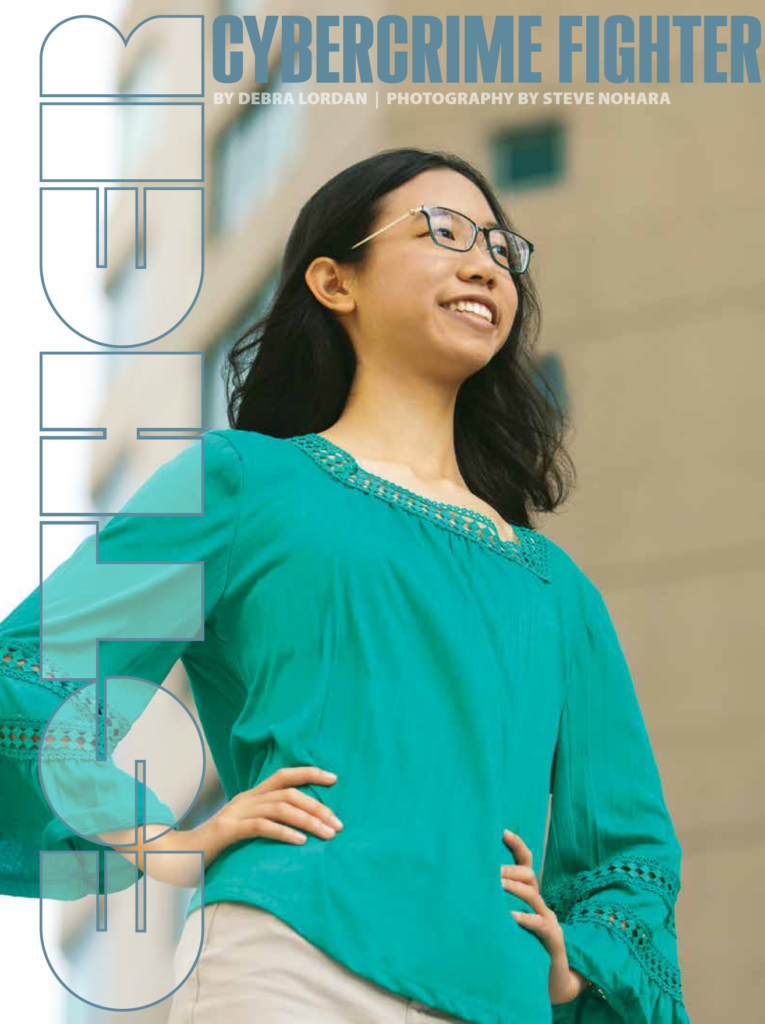 She may not wear a mask or a cape, but in the eyes of Hawai‘i’s kūpuna, Esther Chan is their very own superhero as she continues her battle against online crime in cyberspace — one workshop at a time — wielding only her mighty curriculum and stalwart spirit.
She may not wear a mask or a cape, but in the eyes of Hawai‘i’s kūpuna, Esther Chan is their very own superhero as she continues her battle against online crime in cyberspace — one workshop at a time — wielding only her mighty curriculum and stalwart spirit.
If criminals stole money from your dear grandmother using online trickery and treachery, what would you do about it? When she was a Punahou High School sophomore, Esther took matters into her own hands to protect her grandmother and other unsuspecting elders like her from cyber scams. For Esther, the call to action was not a question of “should I do it” but “how can I do it.”
And so her crusade against cybercrime began.
“In 2021 during the pandemic, my grandma received a pop-up on her computer screen,” recalls Esther. A pop-up is a window that suddenly appears on a website screen or browser that contains advertisements or other information that the user likely did not request. The pop-up asked her to call a phone number. Unsuspecting, she thought is was just a harmless antivirus helpline, so she made the call.
“She was on the phone with them for quite a while, and ended up giving them her bank account numbers and other personal information,” says Esther. “Unfortunately, it was not a legitimate pop-up and they went into her bank account and withdrew money.” After she realized it was a scam, Esther’s father was able to help her grandmother change all of her passwords to mitigate further damage.
“A few hundred dollars was lost, but luckily, nothing super terrible happened,” says Esther. “But it really affected us. It was really scary to have that happen and to realize that similar things are happening to many people across the nation and globally. That realization was really shocking to me.”
 With our increased dependence on technology comes an increased risk of cybersecurity attacks. This year, $8 trillion is predicted to be lost to cybercrime. According to Forbes, global cybercrime costs are estimated to increase to $10.5 trillion annually by 2025. It is also reported that 95% of cybersecurity breaches are a result of human error, which highlights the importance of cybersecurity education in minimizing successful cyberattacks. According to a recent cybercrime report, victims of elder fraud reported losses totaling almost $1.7 billion in 2021, up 74% from 2020. These statistics highlight the need for widespread cybersecurity education for seniors.
With our increased dependence on technology comes an increased risk of cybersecurity attacks. This year, $8 trillion is predicted to be lost to cybercrime. According to Forbes, global cybercrime costs are estimated to increase to $10.5 trillion annually by 2025. It is also reported that 95% of cybersecurity breaches are a result of human error, which highlights the importance of cybersecurity education in minimizing successful cyberattacks. According to a recent cybercrime report, victims of elder fraud reported losses totaling almost $1.7 billion in 2021, up 74% from 2020. These statistics highlight the need for widespread cybersecurity education for seniors.
“Eight trillion is a massive number!” says Esther. “I don’t think people realize how big of an issue these cyberattacks are. That’s really what inspired me to start this whole organization because I saw how easy it was for these scammers to get onto devices and use a tactic called ‘social engineering’ to get people to fall for their scams. I really wanted to be able to help kūpuna, in particular, be able to defend themselves against these sorts of cyberattacks.”
Seniors have become targets for many cybercriminals who utilize trust as their scamming mechanism. Studies have shown that our willingness to trust other human beings increases as we age.
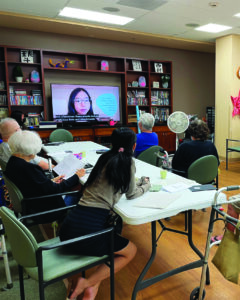 “In general, kūpuna are more vulnerable because they are more trusting,” says Esther. “They may also be less familiar with technology or less aware of cybercrime and may not have anyone to teach them about it.”
“In general, kūpuna are more vulnerable because they are more trusting,” says Esther. “They may also be less familiar with technology or less aware of cybercrime and may not have anyone to teach them about it.”
Another part of the problem is that scammers are highly adaptable and quite sophisticated in mimicking legitimate communications from tech support staff, government agencies, potential romantic partners and even relatives. Seniors with healthy financial savings, good credit scores and a trusting nature are attractive and often lucrative targets for scammers, bringing elders to the frontline of these cyber assaults.
“I believe that helping kūpuna to defend themselves against cybercrime should be a priority in this increasingly digital age and that they deserve more than the dull and obscure cybersecurity curricula that currently exist,” says Esther. “That’s really what inspired me to start the Cyber Safe Seniors organization, seeing the effects of cyberattacks on kūpuna like my own grandmother. What we try to do at Cyber Safe Seniors (gocybersafe.org) is equip kūpuna with the knowledge, tools and resources they need to defend themselves against these attacks.”
VARIATIONS ON SCAMS ARE ENDLESS
The best way to avoid losing money or confidential information to a scammer is by learning to recognize the different types of fraud. Below are a few of the most common scams, however, there are variations of each. Scam artists are devious and will change their tactics in order to steal from you. (Visit gocybersafe.org/resources on Esther’s website).
• IMPERSONATION SCAMS happen when one person pretends to be another — a government official, a caregiver or even a grandchild — and tricks you into giving them what they want.
• ONLINE DATING FRAUD accounted for $304 million lost in 2020 alone. Half of these scams reportedly started through social media.
• UNEXPECTED MONEY SCAMMERS know that most of us would love to receive a large sum of money at the drop of a hat — that’s why these scams are often effective in getting your money.
• LOTTERY SCAMS are one of the most common ways of extracting money from seniors. If you receive a phone call, letter, pop-up message or email saying you’ve won money or an expensive item, be wary. Too good to be true?
• FAKE CHARITY SCHEMES occur most often around the time of a disaster.
• FAKE PRODUCT SCAMS try to convince you that your life will be better with a certain product or service. You then pay for the product or service, but you never receive it.
• DEBT RELIEF SCAMS try make you believe that your debt can be reduced. Scammers will often charge a large upfront fee to help you lower your debt-repayment responsibility, only to disappear after you’ve sent them the money.
• TECH SUPPORT SCAMS often send a pop-up on your computer saying you have a virus or other issue. They will include a phone number for you to call and pressure you into sending them money to fix the fake problem.
That is what happened to Esther’s 85-year-old grandmother, Sophia, when Esther was 16. Concerned about protecting her grandmother and others from the dangers of cybercrime, Esther proceeded to create a curriculum comprised of a series of video lessons to educate kūpuna on how to shield themselves from online scams.
“The attack was definitely one of the components that spurred me on to create the CyberSafety 101 curriculum,” says Esther.
At about the same time her grandmother became a victim of cybercrime, Esther discovered a class through Girl Scouts called “CompuGirls Hawaii” that focused on educating high school girls in STEM, cybersecurity, scams and information technology (IT). Prior to attending the program in 2021, she hadn’t realized how serious of an issue cyberattacks were.
In addition to the attack on her grandmother and the CompuGirls Hawaii course, the chance to pursue a Girl Scout Gold Award project further inspired Esther to equip kūpuna with the knowledge and resources they need to stay safe from cybercrime. “This was a great opportunity to work on something I was really passionate about,” she says. So she started creating scripts and producing video lessons for her Girl Scouts project, Cyber Safe Seniors, beginning with a free, self-paced course called “CyberSafety 101.”
The project drew her to the first-ever Prudential Emerging Visionaries. The national recognition program awards young people for their innovative solutions to financial and societal challenges in their communities. An Emerging Visionary is a changemaker — a young person with a bold vision for impact and a project to make it happen.
She applied to the program and was one of 25 recipients nationwide to receive a $5,000 award. She was also invited to attend a three-day summit at Prudential headquarters in New Jersey, where she met with other youth changemakers for networking sessions and workshops.
“It was really great to meet all the amazing changemakers,” says Esther. “What really made an impact on me personally was that I was able to see what everyone else was doing. All of my peers at the summit were very incredible. They all created their own organizations related to finance and various other social structures. Being able to observe that and be a part of it had a great impact on my project. It was super inspiring. I took a lot of lessons I had learned at the summit back home.”
The young changemakers received coaching sessions with a Prudential representative. She was able to work with Colleen Grimsley, director of New Business Case Management at The Prudential Insurance Company of America. “She gave me some great advice for the project.
”WHAT IS CYBER SAFE SENIORS?
Cyber Safe Seniors, which hosts the CyberSafety 101 curriculum, is an organization and a website (gocybersafe.org) with a mission to keep seniors cyber safe by providing them with access to effective, high-quality cybersecurity education that is as engaging as it is informative.
“This course is the culmination of work by so many people — so many hands,” she says. “I am really grateful to Jodi Ito, who is the chief information security officer of the University of Hawai‘i System, for helping me to verify the accuracy of the information I was giving.”
Dr. Dorothy Hirata, the instructional design manager with the University of Hawai‘i System’s Online Innovation Center, was especially helpful with the second iteration of her course.
“I started in 2021 with an idea of a curriculum,” she says. “I empathized with the kūpuna and tried to figure out what their needs were through research and talking with Jodi about needs — and, of course, my grandmother.”
From there, she worked quite hard on the curriculum. She completed hundreds of hours of research, wrote scripts from scratch, filmed and edited video footage, added activities and compiled all the information for the course.
To test and assess the new curriculum and figure out what was working well and what could be improved, she took the program to One Kalakaua Senior Living and The Plaza at Waikiki, another living community. Out of respect for the visitor restrictions that were instituted during the COVID-19 pandemic, these workshops were hosted using the pre-recorded videos that Esther had created. In return for completing a questionnaire about the curriculum, the residents were entered into a gift card drawing.
“It was well-accepted, and then Esther spent a lot of time improving the program so that it would benefit more seniors,” says One Kalakaua resident Sophia, Esther’s grandmother. “She revised and improved her videos by increasing the sound and adding subtitles to benefit those who are hard of hearing. She also improved her presentation, assembling a team of schoolmates so that they could be more efficient and thorough. When she was invited back a second time, she brought her team along to teach the new and improved course.” For example, team members supplied one-on-one, in-person phone support to show residents how to block spam calls and to answer other questions pertinent to each of the many types of mobile phones now available.
The second presentation after the fine-tuning based on feedback was even more popular, Sophia said. “More residents attended than show up to our most popular exercise classes. They all ended up loving it and learning a lot. Everybody was very happy. It was very successful.”
“Their feedback was very valuable and I am very grateful,” says Esther.
During the pandemic, she also presented her program at other senior homes in Honolulu, and later, AARP Hawaii accepted her project.
“We also got some feedback from members of AARP Hawaii which was quite helpful,” says Esther. “I took all that feedback and implemented it into the second iteration of the curriculum. For instance, I learned that participants found the practical tips helpful. I took all that feedback and incorporated it into the second iteration — the one I worked with Dorothy on — the one that is being used now. Again, we tested and optimized the second version.”
THE CYBERSAFETY 101 COURSE
CyberSafety 101 (gocybersafe.org/the-course) is free, convenient and easy to use. The curriculum is self-paced and you can return to the course whenever you need a refresher. It covers cybersecurity basics, from phishing, to malware, to digital footprints and more.
“This course was created because we believe that everyone — regardless of economic status — deserves access to quality cybersecurity education,” Esther says on her website.
The first thing you do is enroll for the class through a series of fill-in boxes and answer a short questionnaire that assesses your level of cybersecurity knowledge. You are then sent an email that lets you enter the virtual classroom. The videos used to relay the lessons are colorful and clear. The sound is crisp and the information presented by a smiling and articulate Esther is well-paced and easily understood. The information and insights you will receive, along with the amount of money you may save by avoiding an expensive scam, are well worth the short time you will invest in the training — it only takes about an hour.
To spread word of her program, Esther contacted media outlets, such as the Honolulu Star-Advertiser.
She also connected directly to senior centers through email and through personal connections. Esther has since shared the project with the Lanakila Multi-Purpose Senior Center and aims to partner with more organizations and care homes to continue to spread awareness.
Recently, in addition to her online program, Esther has been offering workshops for kūpuna based on her online curriculum, reaching out to care homes directly and coordinating from there.
“We pride ourselves in working with kūpuna side-by-side during workshops and are currently designing a training program to empower others across the nation to do so as well,” says Esther.
She has not been doing it alone, but with the help of her “wonderful board members” who have been working with her for the past year or so. They help organize the workshops and sometimes lead them. “They are all such incredible young women,” she says of her eight peers. “It is definitely a group effort.”
Her handpicked eight-member board have commonalities in addition to being interested in STEM, information technology and cybersecurity. They all have a special place in their heart for their elders. “I think each of them has their own motivation for getting involved with Cyber Safe Seniors (CSS), but in general, they all want to help them,” says Esther.
EVOLVING LEADERSHIP
Through CSS, Esther’s enthusiasm and good will spread to her peers. One of her eight CSS volunteer directors, Irene Zhong, met Esther about three years ago in an accelerated summer chemistry honors course. Irene was impressed by Esther’s curiosity. “I listened to Esther ask our teacher questions after the entire class had left, and I was baffled by their breadth and depth. She inspired me to dig deeper in my own learning and to be unafraid to ask questions.”
She got involved with CSS shortly thereafter. “I wanted to join the board of directors because I live with my grandparents who use technology prolifically,” says Irene. “They are immigrants from China and can’t speak English, so it was even more important for me to work with cyber safety because their risk for attack is higher.”
“Esther is the epitome of a great leader,” says Irene. “She has a great capacity for empathy not only for the elders but for her board members, as well. I appreciate that she does not hover over her board members, but instead gives us autonomy to be creative and make original contributions. For example, Esther gave me full reign to design Cyber Safe Senior’s volunteer shirt.”
“Esther’s greatest traits are her timeliness and work ethic,” says Irene. “She has never been late to an event and never missed a deadline. She also curated, created, and revised the entire Cyber Safe Seniors curriculum on her own, which is a great feat considering the amount of work that goes into script writing, graphic design, recording and editing.”
Her involvement with CSS has deepened her passion for service work, says Irene. “I feel a greater connection to the community and kūpuna, and through Esther, have connected with many of my peers — most of whom I would not have been friends with without Esther’s organization,” says Irene. “CSS has also given me experience with leadership and oversight. I am now more confident in organizing and managing volunteers, and coordinating with different branches of the organization.”
“Before I leave for college, my goal is to create a community of cyber safe volunteers who are passionate about this work,” says Irene.
ESTHER’S TIME TO SHINE
Esther’s experiences with CSS helped her to overcome her innate shyness, learn how to take risks and reach outside of her comfort zone to become one of Hawai‘i’s unsung heroes. Along the way, she has garnered much recognition and many accolades.
Of course, Esther earned her coveted Girl Scouts USA Gold Award Scholarship and was featured on the national GSUSA website. After she received the Prudential award in 2022, Esther was recognized by the Hawai‘i State Legislature during Hawai‘i Education Week. She is a Coca-Cola Scholarship Semifinalist, National Merit Semi-Finalist, and was one of four Carson Scholars nationwide who received the Michael Hollins Foundation Award for exceptional humanitarianism. She also received the Violet Richardson Soroptimist Award, George HW Bush Point of Light Award, a Punahou Distinction in Student Entrepreneurship and the President’s Gold Volunteer Service Award in recognition of 129 hours of service to the nation. Inscribed at the bottom of the award: “The country is counting on you.”
METAMORPHOSIS
“The whole project was a risk for me,” says Esther. “I learned so much about sticking with it and putting up with challenges and working through them.”
“I’ve always been a driven person and I am passionate about a lot of things,” says Esther. “I feel that this organization really stemmed from that. I didn’t lay out a plan to do this; it developed organically out of a passion for helping others, especially seniors. From there it just blossomed.”
“This project has definitely contributed to my personal growth — more than anything else I have done. It has been an incredible experience and I have learned countless lessons. Cyber Safe Seniors has been very meaningful to me, and I feel that I have poured out my heart into this organization in a lot of ways. I have been blessed to have been able to gain so much from it in terms of skills I’ve learned and relationships I’ve built. It’s been incredible.”
“Two years ago, I would not have envisioned myself where I am today in terms of this organization. I am incredibly grateful for everyone who was there to support me — God, my parents and my mentors and peers at Prudential. In terms of the organizational aspect of the project, my mom has been a really great role model for me because she is very driven and likes to take initiative. She leads a prayer group and is on the board of our church. She is really involved, so I drew a lot from her example.”
THE CRUSADE AGAINST CYBERCRIME
Given that Esther launched her career path at 16, where does she plan to go from here? “In terms of where this program is going to go next, I think the plan right now is to pass the program on to younger students and get them to become leaders and head this project throughout the state.” Esther will continue to support the Hawai‘i branch of the organization from afar and perhaps start a new chapter of Cyber Safe Seniors wherever she attends college.
“It would be really cool if I could start another branch where I go to college and continue to expand it. I’m not sure what the future holds but I am excited for where this can go seeing how it has blossomed so far. I think it has a lot of potential to expand statewide, nationally and even internationally.”
To that end, Esther and her team have developed a self-contained teaching package that can be easily distributed to care homes anywhere. The single package includes the curriculum, notes on how to run the workshop and frequently asked questions.
“The main thing I’ve learned from this project is how to be a good leader. I am not a perfect leader, but this project has taught me that being a leader is really about empowering other people to be able to create their own vision for a project and take their own initiative. It is about empowering others to become leaders themselves. Before this, I never really thought of myself as a leader, but through CSS, I have really been able to grow into that role and I’ve been able to learn much more about what being a leader actually entails.”
“I love helping others and aspire to become a good role model for future generations — someone who brings peace and hope to this chaotic world and whose character inspires others,” says Esther.
A DIFFERENT KIND OF TEENAGER
“The family’s way of life is totally different and she is a different kind of teenager,” says Sophia. Esther is intelligent, curious and hardworking. She’s an explorer and an achiever who always does her best. Anything that is difficult, she will try it out. She was taught to do her best to excel in whatever studies or activities she is participating in. “I‘m really proud of her.”
“I am very thankful that God protected me and that He can change something so bad — the scam — into a very good thing — something that benefits me, my friends here and so many seniors in Hawai‘i and in other states,” says Sophia. “It is all because of the way Esther was brought up by very good, God-centered parents, my son Stephen, a cardiologist at Kaiser Permanente, and my daughter-in-law Monica, who is also a detail-oriented achiever.”
Both parents are Harvard graduates. It follows that education along with healthy eating and exercise are important in their family dynamic.
Esther and her two younger brothers were raised to not follow popular culture — they do not spend time on social media, and don’t have a TV in their home —“but to follow the Lord’s command to honor God, be kind and compassionate to others,” says Sophia.
When she was a freshman, she started holding a food drive every year in their apartment building. “Nobody asked her to do that,” says Sophia.
Esther is not really interested in things like fashion and trends, the lifeblood of many her age. “We encourage every member of every generation of our family to fly high,” says Sophia. Instead, Esther is very busy adhering to the unwritten family motto: “You do not complain. You overcome.”
Many forces of good fuel Esther’s superpowers — her humble nature, maturity, discipline, innate compassion and kindness, and her family legacy of fortitude, faith and respect for education. The self-sacrificing Punahou senior manifested her super-abilities by rising to the call in times of trauma and need.
Her disguise — her secret identity — is transparent now. No longer the shy, introverted teenager she once was, she has grown wings and metamorphosed into an intrepid force that any CEO would envy, as her talents and abilities have been recognized by all who meet her as significantly beyond those of “normal” people.
The world needs more superheroes like Esther and her team to help combat cybercrime — mask and cape not required.
The best way to contact Esther Chan is via email at: emailcybersafe@gmail.com.

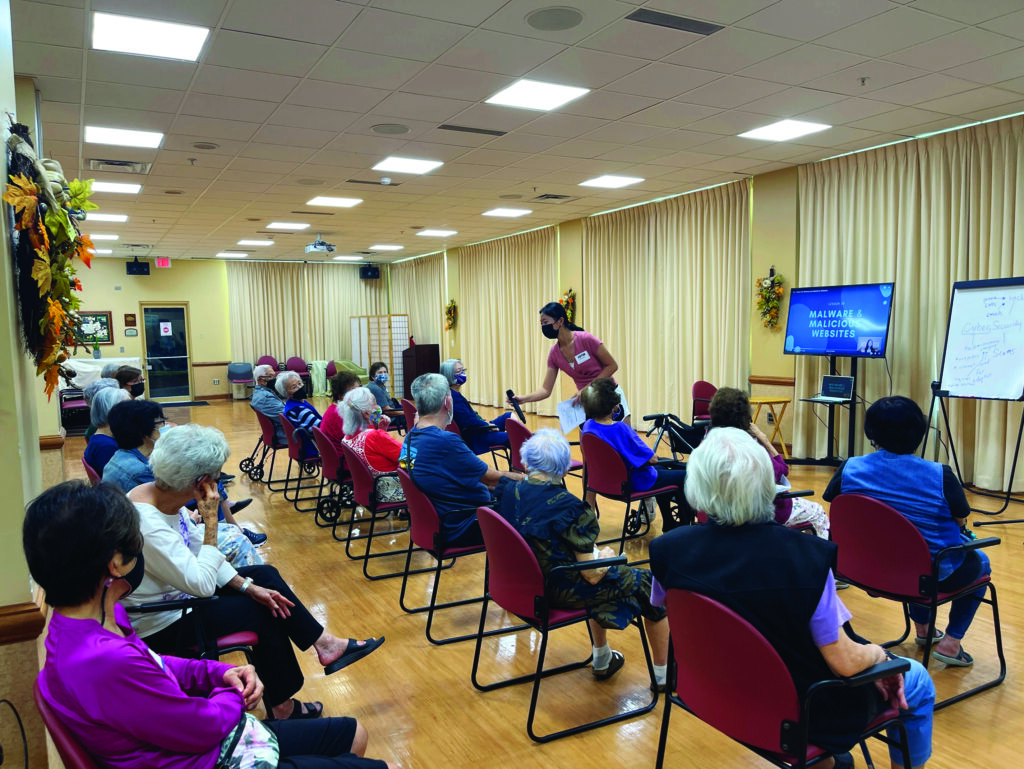
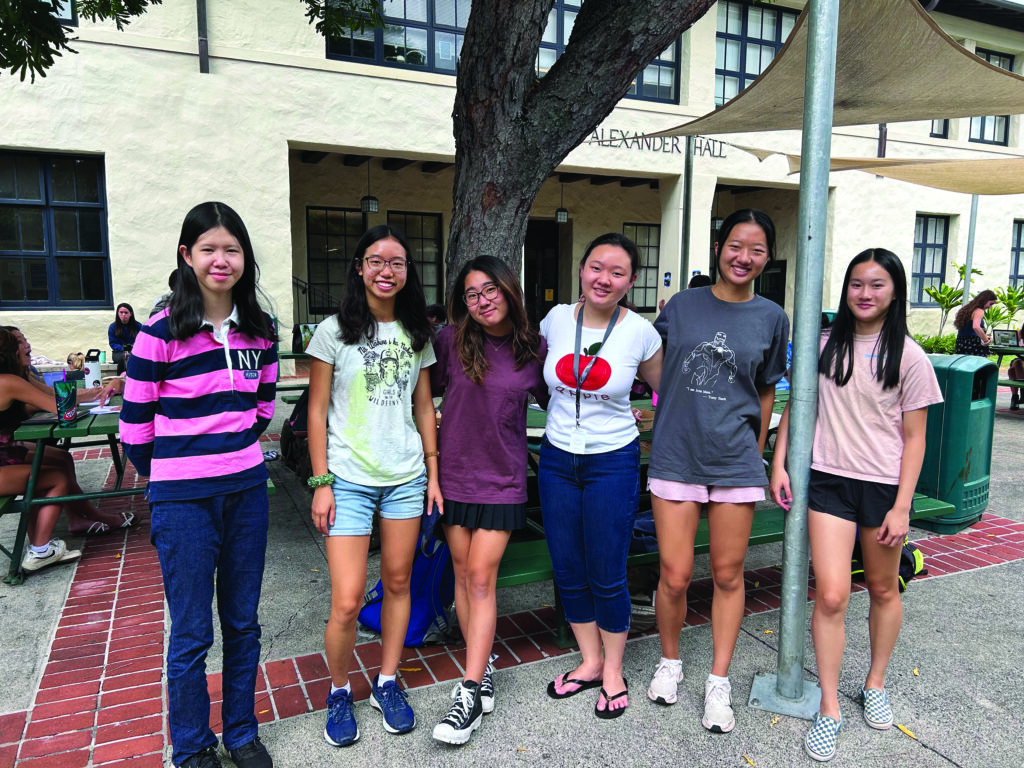

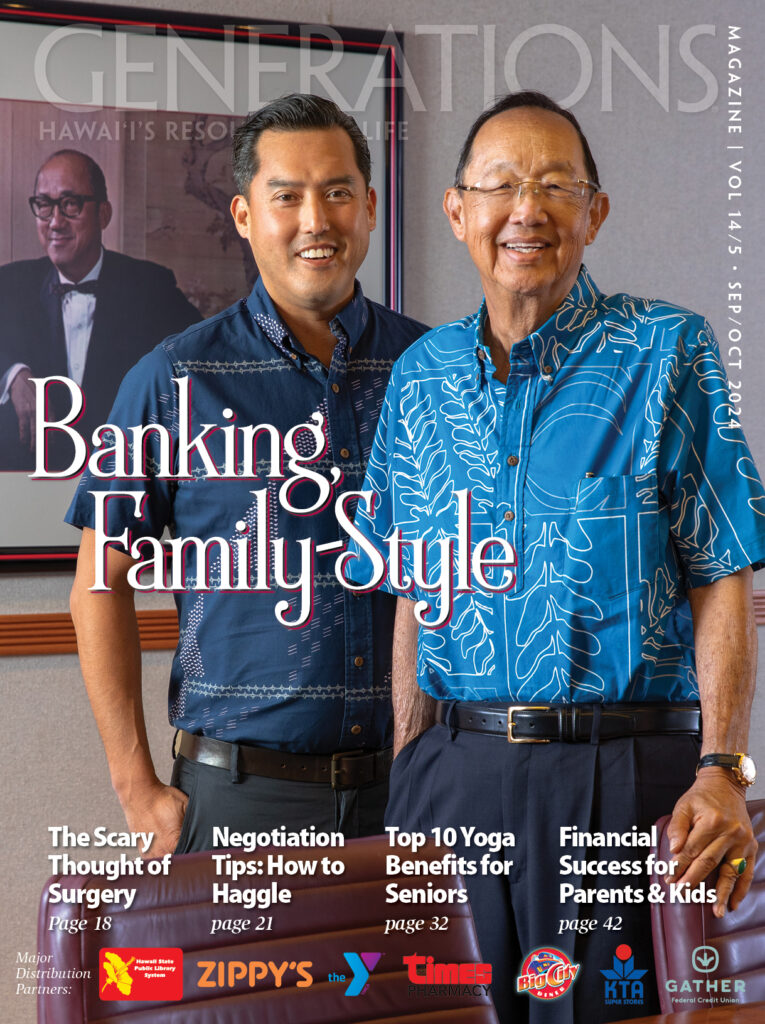
Leave a Reply